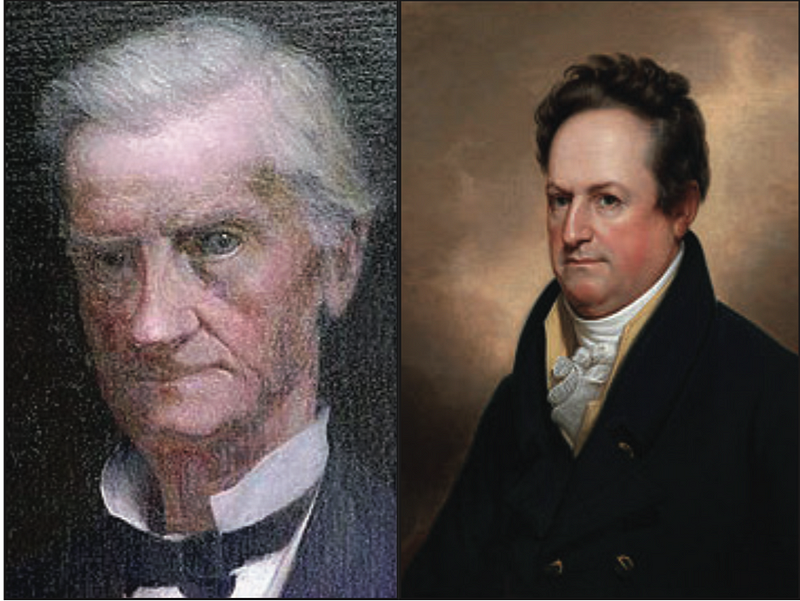Clinton to Clinton in Clinton
Many parents have concerns and anxieties about taking their children to college for the first time. That is nothing new, as we see in DeWitt Clinton’s letters to his son, George, who entered his freshman year at Hamilton College in September 1822.
DeWitt Clinton was born in 1769 to his father, James Clinton, who was a general in the Continental Army. His uncle was George Clinton, New York’s first governor, and the man after whom the Village of Clinton was named.
DeWitt Clinton attended Kingston Academy, then continued his studies at King’s College, which would later become Columbia University.
In 1802 and 1803 he served as United States Senator from New York and then returned in 1803 to become mayor of New York. He was later elected as Lieutenant Governor from 1811 to 1815.
In 1812, DeWitt Clinton ran for president as a candidate of the Federalist Party, but was defeated by James Madison. After Governor Tompkins had been elected vice-president in 1816, Clinton won a special election for governor of New York and took office on July 1, 1817. Later that year, he got the legislature to approve a $7,000,000 budget for the Erie Canal, which many thought impractical.
He was not nominated by his party to run in 1822, but was elected again in 1824, and he continued to serve as governor until he died in office in February 1828.

His son, George William Clinton, one of ten children, was born in 1807. George Clinton enrolled at Hamilton College at age 14 in 1821 and graduated in 1825. In 1939, the Hamilton Alumni Review published an interesting article by Harold W. Thompson about correspondence from DeWitt to George. Highlights follow.
Starting in December 1821, when George was a 14-year-old first-year, his father wrote that “a good character depends on virtue and talents and that both are the fruits of cultivation; industry is like the labor of Hercules, it can conquer all difficulties; avoid dissipation and bad company; be civil to all; respectful to your superiors; kind to your companions.”
Governor Clinton often chided George for not writing and warned him to continue to be a good student. In October 1822, DeWitt wrote, “I trust you will continue the cultivation of virtue with the acquisition of knowledge. Avoid falsehood, intemperance, and gambling as you would a den of serpents. They are low vices and equally incompatible with honor and religion. Nature has been bountiful to you; you have a character to establish and a name to support and it will be your own fault if you fail in either.”
In a later letter, Clinton reminds George that drinking and gambling are the “rocks on which the happiness of thousands is so often wrecked and therefore I will not obtrude a caution on this odious subject.”
George must have been an infrequent letter writer, as in November 1822, his father frankly admonished him: “You are a negligent correspondence and if I had a father that I loved and that loved me, I am sure I would write to him a letter for letter.”
DeWitt Clinton often wrote and quoted Latin in his letters and referred to many giants of literature such as Locke, Addison, Bacon, Swift, Johnson, Horace, Cicero, Pope, Hibernicus, and Spencer. DeWitt also sent money from time to time: $2.00, then $5.00, then $3.00.
The Governor visited Hamilton College in May and October of 1822. In October — along with George — he had breakfast at Mr. Foote’s Inn (run by the son of Clinton founder Moses Foote and located at 1 West Park Row, where Utica Coffee is today.)
Parents’ concerns in 1822’s and today have not really changed dramatically. The traits of staying healthy, studying hard, being good students and good citizens, staying sober, and amounting to something remain pretty constant. DeWitt Clinton told his son frankly how to behave. For a young college student of age 14, perhaps this was necessary.
George studied law and became District Attorney of Ontario County, then moved to Buffalo in 1836 where he organized the Democratic Party. In 1838, President Martin Van Buren appointed him Collector of Customs in Buffalo.
He served a one-year term as Buffalo’s mayor from 1842 to 1843 and was appointed United States Attorney for the Northern District of New York from 1847 to 1850. George became active in the University of Buffalo Medical School as a trustee, founded the Buffalo Society of Natural Sciences and served as president for 20 years. He was also a state judge, a park commissioner, a member of the Board of Regents, and, in his later years, moved to Albany to edit his father’s papers.
He died in 1885 and is buried in Forest Lawn Cemetery in Buffalo after a long, active life in law, science, and civic affairs. His father would have been proud and pleased, and probably would have felt that his stern letters had a positive effect.

























